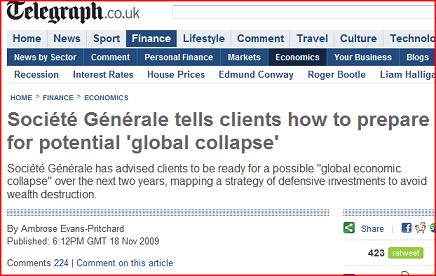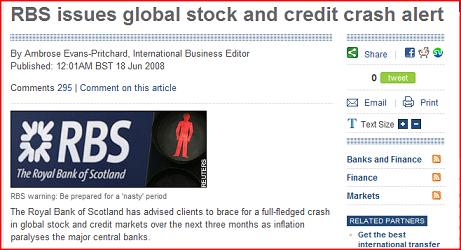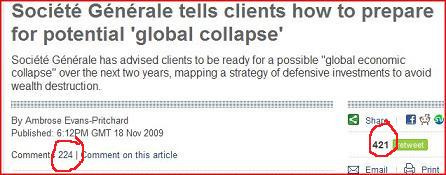November 27, 2009
The Coming Global Collapse, Sponsored By British Airways

if you can supply the prose I can supply the crystal ball
If you're even moderately interested in the financial news, you've probably seen this:

Wow. What makes it scarier is that this is in the Telegraph, which, in June 2008 reported:

I remember this story so well that when I needed today to find the link, I remembered the full title. Same newspaper, same author. I'm sure I'm not the only one who saw the similarity. And, of course, two months later the freefall started, and the S&P lost half its value.
II.
Maybe it's my... perspective... but when I saw the story, something else caught my eye:

The 2008 article had 293 comments. The average Telegraph story gets 20 comments.
My first, cynical thought was: they wouldn't make up a story to generate traffic and ad revenue (British Airways), just because they know it worked the last time, would they?
I mean, "global collapse" is in quotes, right? Soc Gen had to have said it, right?
III.
A look at the actual report shows something a little different: Soc Gen outlines 3 possibilities-- Bear, Central, and Bull scenarios, each detailed with unnecessarily complex graphics.
They don't think the "Worst Case Scenario," will happen, they are just describing it. Their actual belief is stabilization in 2009, and recovery in 2 or 3 years.
IV.
So why report it it this way? Why write a news story about something Soc Gen doesn't believe is going to happen? Before you answer, consider that they only wrote about the "worst case scenario," not the Central and Bull scenarios.
It's bad enough that the story is misleading, and that it provides no useful news. What makes it dangerous is that it is misleading precisely to draw readers; and by becoming popular it then causes things to happen.
Newspapers are not objective informational resources, they are blogs. The sooner you internalize that comparison, the sooner you will be free.

Wow. What makes it scarier is that this is in the Telegraph, which, in June 2008 reported:

I remember this story so well that when I needed today to find the link, I remembered the full title. Same newspaper, same author. I'm sure I'm not the only one who saw the similarity. And, of course, two months later the freefall started, and the S&P lost half its value.
II.
Maybe it's my... perspective... but when I saw the story, something else caught my eye:

The 2008 article had 293 comments. The average Telegraph story gets 20 comments.
My first, cynical thought was: they wouldn't make up a story to generate traffic and ad revenue (British Airways), just because they know it worked the last time, would they?
I mean, "global collapse" is in quotes, right? Soc Gen had to have said it, right?
III.
A look at the actual report shows something a little different: Soc Gen outlines 3 possibilities-- Bear, Central, and Bull scenarios, each detailed with unnecessarily complex graphics.
They don't think the "Worst Case Scenario," will happen, they are just describing it. Their actual belief is stabilization in 2009, and recovery in 2 or 3 years.
IV.
So why report it it this way? Why write a news story about something Soc Gen doesn't believe is going to happen? Before you answer, consider that they only wrote about the "worst case scenario," not the Central and Bull scenarios.
It's bad enough that the story is misleading, and that it provides no useful news. What makes it dangerous is that it is misleading precisely to draw readers; and by becoming popular it then causes things to happen.
Newspapers are not objective informational resources, they are blogs. The sooner you internalize that comparison, the sooner you will be free.
12 Comments